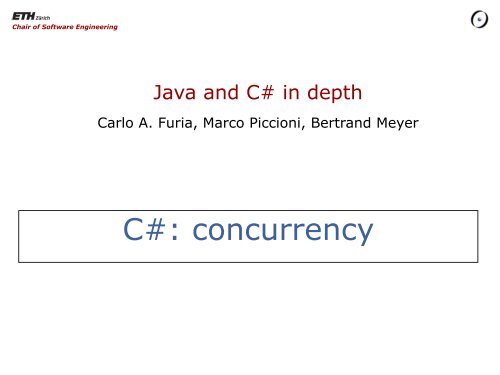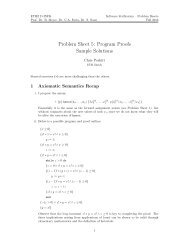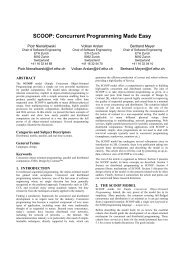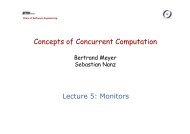C Sharp - Chair of Software Engineering
C Sharp - Chair of Software Engineering
C Sharp - Chair of Software Engineering
Create successful ePaper yourself
Turn your PDF publications into a flip-book with our unique Google optimized e-Paper software.
<strong>Chair</strong> <strong>of</strong> S<strong>of</strong>tware <strong>Engineering</strong><br />
Java and C# in depth<br />
Carlo A. Furia, Marco Piccioni, Bertrand Meyer<br />
C#: concurrency
Outline<br />
§ C# threads<br />
§ thread implementation<br />
§ sleep and join<br />
§ threads that return values<br />
§ Thread synchronization<br />
§ implicit locks and synchronized blocks<br />
§ producer/consumer example<br />
§ More efficient concurrency<br />
§ thread pools<br />
§ atomic integers<br />
§ Other concurrency models<br />
§ asynchronous programming<br />
§ polyphonic C#<br />
Java and C# in depth<br />
2
<strong>Chair</strong> <strong>of</strong> S<strong>of</strong>tware <strong>Engineering</strong><br />
Java and C# in depth<br />
Carlo A. Furia, Marco Piccioni, Bertrand Meyer<br />
C# threads
C# threads<br />
C#’s concurrency model is based on threads<br />
Threads are created by instantiating class Thread<br />
§ The constructor takes a ThreadStart delegate that<br />
wraps the method which the thread will execute<br />
Any method can be called with the delegate mechanism<br />
§ Unlike Java, any existing class can be used for multithreaded<br />
execution without modifications<br />
In all the examples, assume<br />
using System; using System.Threading;<br />
Java and C# in depth<br />
4
A simple class (to be threaded)<br />
public class DumbClass {<br />
private String id;<br />
public DumbClass(String id) {<br />
}<br />
this.id = id;<br />
}<br />
public void print_id() {<br />
// do something<br />
Console.WriteLine("This is " + id);<br />
}<br />
Java and C# in depth<br />
5
Creating and starting a thread<br />
Create the object with the method the thread will execute<br />
DumbClass db = new DumbClass(“db”);<br />
Create a Thread object and pass method print_id to is<br />
using a ThreadStart delegate<br />
Thread mt = new Thread(<br />
new ThreadStart(db.print_id));<br />
Start the thread<br />
mt.Start();<br />
Optionally, wait for it to terminate<br />
mt.Join(); // wait until mt terminates<br />
Console.WriteLine(<br />
"The thread has terminated");<br />
Java and C# in depth<br />
6
Putting a thread to sleep<br />
The Sleep(int t) static method suspends the thread in<br />
which it is invoked for t milliseconds<br />
Thread.Sleep(2000); // suspend for 2 seconds<br />
§ the timing may be more or less precise according to the<br />
real-time guarantees <strong>of</strong> the executing environment<br />
Java and C# in depth<br />
7
Threads that return values<br />
Threads can return values using additional delegates<br />
§<br />
§<br />
E.g., to have threads that return strings declare a delegate type:<br />
public delegate void delForStrings(String s);<br />
A class stores a reference to the delegate and activates it when<br />
appropriate (to pass values to the caller)<br />
public class DullClass {<br />
private String id;<br />
// delegate used to return a value when terminating<br />
private delForStrings d;<br />
// the constructor must bind the actual method<br />
public DullClass(String id, delForStrings d)<br />
{ this.id = id; this.d = d; }<br />
public void give_id() {<br />
// call the delegate to return the value id<br />
}}<br />
if (d != null) { d(id); }<br />
Java and C# in depth<br />
8
Creating threads that return values<br />
Define a method to process the information returned by the<br />
thread (its signature matches the delegate’s)<br />
§ for simplicity, we make it static<br />
public static void printValueSent(String<br />
s) {<br />
}<br />
Console.WriteLine(“The thread sent: “ + s);<br />
Create the object with the method the thread will execute and<br />
pass the delegate to it<br />
DullClass dl = new DullClass(“dl”,<br />
new delForString(printValueSent));<br />
Java and C# in depth<br />
9
Creating threads that return values<br />
Create a Thread object and pass method give_id to is<br />
using a ThreadStart delegate<br />
Thread t = new Thread(<br />
new ThreadStart(dl.give_id));<br />
Start the thread<br />
t.Start();<br />
After executing, it will invoke printValueSent through the<br />
delegate, which will print the given id<br />
Java and C# in depth<br />
10
<strong>Chair</strong> <strong>of</strong> S<strong>of</strong>tware <strong>Engineering</strong><br />
Java and C# in depth<br />
Carlo A. Furia, Marco Piccioni, Bertrand Meyer<br />
Thread synchronization
Synchronization with locks<br />
The lock statement supports synchronization based on locks<br />
§ blocks <strong>of</strong> statements guarded by lock(o)<br />
§ the lock o itself can be any object (including this)<br />
§ locking/unlocking is implicit when entering/exiting the<br />
block<br />
§ useful to define critical regions and fine-grained<br />
synchronization<br />
§ monitors are implemented by locking the whole method<br />
body on this<br />
Java and C# in depth<br />
12
Synchronization with locks<br />
The lock statement supports synchronization based on locks<br />
// s must be accessed in mutual exclusion<br />
private int s;<br />
// dict is a read-only object, no concurrency problems<br />
private List dict;<br />
public String decrement_and_lookup() {<br />
}<br />
// critical region<br />
lock(this) { if (s > 0) { s = s - 1; } }<br />
// non-critical region<br />
return dict.Item(s);<br />
Java and C# in depth<br />
13
Coordination with signals<br />
Locked threads can communicate with signals, implemented<br />
as static methods <strong>of</strong> class Monitor:<br />
§ Monitor.Wait(o): suspend and release the lock on o<br />
until some thread does a Pulse(o) or PulseAll(o)<br />
§ Monitor.Pulse(o): resume one suspended thread<br />
(chosen nondeterministically) waiting on object o, which<br />
becomes ready for execution when possible<br />
§ Monitor.PulseAll(o): resume all suspended<br />
threads waiting on object o, which become ready for<br />
execution when possible<br />
§ Analogues <strong>of</strong> Java’s wait, notify, notifyAll<br />
Java and C# in depth<br />
14
Coordination with events<br />
A more fine-grained (and possibly efficient) coordination uses<br />
services <strong>of</strong> the WaitHandle class to coordinate threads<br />
Coordination events are in one <strong>of</strong> two states: signaled and<br />
unsignaled<br />
§ Method Set puts an event in the signaled state<br />
§ that is, it issues the signal<br />
§ Method Reset puts an event in the unsignaled state<br />
§ that is, it cancels the signal<br />
Java and C# in depth<br />
15
Coordination with events<br />
A more fine-grained (and possibly efficient) coordination uses<br />
services <strong>of</strong> the WaitHandle class to coordinate threads<br />
Two main classes implement coordination events<br />
§ AutoResetEvent<br />
§ automatically resets to unsignaled after being received by<br />
one <strong>of</strong> the waiting threads<br />
§ ManualResetEvent<br />
§ does not automatically reset, hence it can be received by<br />
more than one waiting thread<br />
§ can be reset with method Reset()<br />
Java and C# in depth<br />
16
Coordination with events<br />
Use services <strong>of</strong> the WaitHandle class to coordinate threads<br />
A thread can block waiting for an event using some methods <strong>of</strong><br />
the class<br />
§ WaitHandle.WaitOne() waits for the event to be<br />
signaled (and blocks until then)<br />
§ static WaitHandle.WaitAny(WaitHandle[] e)<br />
waits for any <strong>of</strong> the events in array e.<br />
§ The method returns when an event is received<br />
§ It returns an integer i, which is an index within array e<br />
§ e[i] is the event that has been received<br />
§ static WaitHandle.WaitAll(WaitHandle[] e)<br />
waits for all the events in array e to be signaled.<br />
Unlike Monitor.Wait, if these wait primitives occur in a lock<br />
block they do not release the lock while waiting.<br />
Java and C# in depth<br />
17
The producer-consumer problem<br />
Two threads, the Producer and the Consumer, work<br />
concurrently on a shared Buffer <strong>of</strong> bounded size<br />
The Producer puts new messages in the buffer<br />
§ if the buffer is full, the Producer must wait until the<br />
Consumer takes some messages<br />
§ the Producer also signals the last message<br />
The Consumer takes messages from the buffer<br />
§ if the buffer is empty, the Consumer must wait until the<br />
Producer puts some new messages<br />
§ the Consumer terminates after the last message<br />
Consistent access to the Buffer requires locks and<br />
synchronization<br />
One way is to define critical regions when accessing the buffer<br />
data structure (with lock) and signal events<br />
Java and C# in depth<br />
18
The main class<br />
public class ProducerConsumer {<br />
}<br />
public static void main(String[] args) {<br />
// create a synchronizer object<br />
Synchronizer s = new Synchronizer();<br />
// create a buffer <strong>of</strong> size 3<br />
Buffer b = new Buffer(3, s);<br />
// create producer and consumer<br />
Producer p = new Producer(b, s);<br />
Consumer c = new Consumer(b, s);<br />
// instantiate threads<br />
Thread pT = new Thread(p.produce);<br />
Thread cT = new Thread(c.consume);<br />
// start them<br />
pT.Start(); cT.Start();<br />
Java and C# in depth<br />
19
Events for synchronization (1/2)<br />
using System; using System.Threading;<br />
using System.Collections;<br />
using System.Collections.Generic;<br />
public class Synchronizer {<br />
private EventWaitHandle takeEvent;<br />
public EventWaitHandle TakeEvent<br />
{ get { return takeEvent; } }<br />
private EventWaitHandle giveEvent;<br />
public EventWaitHandle GiveEvent<br />
{ get { return giveEvent; } }<br />
private EventWaitHandle endEvent;<br />
public EventWaitHandle EndEvent<br />
{ get { return endEvent; } }<br />
Java and C# in depth<br />
20
Events for synchronization (2/2)<br />
}<br />
public Synchronizer() {<br />
// events initialized to unsignaled state<br />
}<br />
takeEvent = new AutoResetEvent(false);<br />
giveEvent = new AutoResetEvent(false);<br />
endEvent = new ManualResetEvent(false);<br />
§<br />
§<br />
§<br />
takeEvent is an AutoResetEvent so it is received by exactly one<br />
waiting thread among all those waiting for a take to happen.<br />
giveEvent is an AutoResetEvent so it is received by exactly one<br />
waiting thread among all those waiting for a give to happen.<br />
endEvent is a ManualResetEvent so it is received by all waiting<br />
threads: they will all be notified that they can terminate.<br />
Java and C# in depth<br />
21
The shared Buffer (1/3)<br />
public class Buffer {<br />
public Buffer(int max_size, Synchronizer s) {<br />
this.max_size = max_size;<br />
this.messages = new Queue();<br />
this.s = s;<br />
}<br />
// buffer <strong>of</strong> messages, managed as a queue<br />
private Queue messages;<br />
// maximum number <strong>of</strong> elements in the buffer<br />
private int max_size;<br />
// reference to events for synchronization<br />
private Synchronizer s;<br />
Java and C# in depth<br />
22
The shared Buffer (2/3)<br />
}<br />
public String take() {<br />
if (messages.Count == 0) {<br />
// only one thread receives the event<br />
}<br />
WaitHandle.WaitAny(<br />
// wait until a give occurs<br />
new WaitHandle[] {s.GiveEvent});<br />
// now the buffer is not empty<br />
lock(this) {<br />
}<br />
m = messages.Dequeue();<br />
// signal that a take has occurred<br />
s.TakeEvent.Set();<br />
return m;<br />
Java and C# in depth<br />
23
The shared Buffer (3/3)<br />
}<br />
public void give(String msg) {<br />
}<br />
if (messages.Count == max_size) {<br />
// only one thread receives the event<br />
WaitHandle.WaitAny(<br />
// wait until a take occurs<br />
new WaitHandle[] {s.TakeEvent});<br />
}<br />
// now the buffer has at least an available slot<br />
lock(this) {<br />
}<br />
messages.Enqueue(msg);<br />
// signal that a give has occurred<br />
s.GiveEvent.Set();<br />
Java and C# in depth<br />
24
The Producer (1/2)<br />
public class Producer {<br />
// a reference to the shared buffer<br />
private Buffer b;<br />
// events to synchronize on<br />
private Synchronizer s;<br />
// set the reference to the buffer and synchronizer<br />
public Producer(Buffer b, Synchronizer s) {<br />
this.b = b;<br />
this.s = s;<br />
}<br />
Java and C# in depth<br />
25
The Producer (2/2)<br />
public void produce() {<br />
}<br />
// work for 20 turns<br />
for (int i = 0; i < 20; i++) {<br />
}<br />
// put a message in the buffer<br />
b.give(i.ToString());<br />
// signal that production has ended<br />
s.EndEvent.Set();<br />
}<br />
Java and C# in depth<br />
26
The Consumer (1/2)<br />
public class Consumer {<br />
// a reference to the shared buffer<br />
private Buffer b;<br />
// events to synchronize on<br />
private Synchronizer s;<br />
// set the reference to the buffer and synchronizer<br />
public Producer(Buffer b, Synchronizer s) {<br />
this.b = b;<br />
this.s = s;<br />
}<br />
Java and C# in depth<br />
27
The Consumer (2/2)<br />
public void consume() {<br />
}<br />
// loop as new events arrive, until:<br />
// EndEvent is signaled AND b is empty<br />
while ( WaitHandle.WaitAny( new WaitHandle[]<br />
{s.GiveEvent, s.EndEvent}) != 1<br />
}<br />
|| !b.Empty ) {<br />
string m = b.take();<br />
Console.WriteLine(<br />
"Consumer has consumed message " + m );<br />
}<br />
Java and C# in depth<br />
28
<strong>Chair</strong> <strong>of</strong> S<strong>of</strong>tware <strong>Engineering</strong><br />
Java and C# in depth<br />
Carlo A. Furia, Marco Piccioni, Bertrand Meyer<br />
More efficient concurrency
Concurrency and performance<br />
Thread creation is time-consuming<br />
§ massive thread creation can annihilate responsiveness<br />
§ C#’s solution: thread pools<br />
Lower-level primitives are available<br />
§ Mutex class for mutexes<br />
§ less efficient than monitors and lock (unlike Java)<br />
§ Interlocked static class<br />
§ atomic operations on integers<br />
Tip: don’t forget the efficiency/abstraction trade-<strong>of</strong>f<br />
Java and C# in depth<br />
30
Thread pools<br />
Thread pools are an efficient way <strong>of</strong> running multi-threaded<br />
applications<br />
§ maintain a pool <strong>of</strong> worker threads<br />
§ when a client requests a new task to run, preempt one <strong>of</strong><br />
the available worker threads and assign it to the task<br />
§ no creation overhead upon task invocation<br />
C#’s static class System.Threading.ThreadPool<br />
§ QueueUserWorkItem(WaitCallback w,Object o):<br />
schedule delegate w for execution by a worker thread,<br />
when possible; o is passed as argument to w.<br />
Java and C# in depth<br />
31
Thread pool thread creation<br />
Create a wrapper delegate for each method to be threaded<br />
§ In the Producer/Consumer example:<br />
public static void Main(string[] args) {<br />
}<br />
Producer p = new Producer(b, s);<br />
Consumer c = new Consumer(b, s);<br />
ThreadPool.QueueUserWorkItem(new<br />
WaitCallback(consuming), c);<br />
ThreadPool.QueueUserWorkItem(new<br />
WaitCallback(producing), p);<br />
public static void consuming(object o)<br />
{ ((Consumer) o).consume(); }<br />
public static void producing(object o)<br />
{ ((Producer) o).produce(); }<br />
There’s an undesirable side-effect with this code as is.<br />
What is it?<br />
Java and C# in depth<br />
32
Thread pool thread creation<br />
Create a wrapper delegate for each method to be threaded<br />
§ In the Producer/Consumer example:<br />
public static void Main(string[] args) {<br />
}<br />
Producer p = new Producer(b, s);<br />
Consumer c = new Consumer(b, s);<br />
ThreadPool.QueueUserWorkItem(new<br />
WaitCallback(consuming), c);<br />
ThreadPool.QueueUserWorkItem(new<br />
WaitCallback(producing), p);<br />
There’s an undesirable side-effect with this code as is.<br />
What is it?<br />
§ Main terminates after invoking QueueUserWorkItem;<br />
hence the ThreadPool object is deallocated and the<br />
worker threads forcefully terminated!<br />
Java and C# in depth<br />
33
Interlocked class<br />
C#’s implementation <strong>of</strong> atomic operations on integers<br />
// shared variable<br />
int s;<br />
...<br />
// this is equivalent to an atomic s++<br />
Interlocked.Increment(ref s);<br />
...<br />
// this is equivalent to an atomic s--<br />
Interlocked.Decrement(ref s);<br />
Java and C# in depth<br />
34
<strong>Chair</strong> <strong>of</strong> S<strong>of</strong>tware <strong>Engineering</strong><br />
Java and C# in depth<br />
Carlo A. Furia, Marco Piccioni, Bertrand Meyer<br />
Other concurrency models:<br />
Asynchronous programming
Concurrency and correctness<br />
Programming thread-safe data structures is error-prone<br />
§ Thread-safe collections are available since C# 4.0<br />
§ Current collections provide a SyncRoot object for<br />
synchronization<br />
Threads and monitors are too general for straightforward<br />
parallel computation<br />
§ C#’s solution: asynchronous methods<br />
Tip: don’t forget the efficiency/abstraction trade-<strong>of</strong>f<br />
Java and C# in depth<br />
36
Asynchronous programming<br />
C# 5.0 introduced simple mechanisms to have methods<br />
execute asynchronously and wait for one another.<br />
The model is based on asynchronous methods:<br />
async Task DoAsync()<br />
§ DoAsync may execute asynchronously from its clients<br />
§ In turn, its clients can wait for DoAsync’s to complete (and<br />
only then access its result).<br />
(The class Task can also be used independent <strong>of</strong><br />
asynchronous methods, mostly to introduce forms <strong>of</strong> databound<br />
parallelism.)<br />
Java and C# in depth<br />
37
Asynchronous methods<br />
async Task DoAsync()<br />
Asynchronous methods:<br />
§ Are declared as such with the keyword async<br />
§ Can have only specific return types:<br />
§<br />
§<br />
§<br />
Task for methods returning values <strong>of</strong> type T<br />
Task for methods returning no values<br />
void for methods returning no values used as event<br />
handlers<br />
§ Cannot have ref or out arguments (there’s no way to<br />
“wait” for those)<br />
§ By convention, have name ending in “Async”<br />
§ Can wait for other asynchronous methods to complete using<br />
Java and C# in depth<br />
the await instruction in their bodies.<br />
38
Waiting<br />
async Task DoAsync()<br />
When an asynchronous method DoAsync executes an<br />
await:<br />
§ Control may return to the caller (the compiler/runtime<br />
decides if a context switch is worth the cost)<br />
§ The caller will be able to retrieve the result later when<br />
available, after awaiting<br />
§ No new thread is created: the asynchronous computation<br />
uses the thread executing DoAsync<br />
The result obtained when awaiting for an asynchronous<br />
method with return type Task has type T.<br />
Java and C# in depth<br />
39
Asynchronous programming: example<br />
Write a method AvgAgesAsync that computes the average age <strong>of</strong><br />
the population <strong>of</strong> several cities.<br />
The data for each city is accessible remotely using a library method:<br />
async Task GetAgesAsync(String city)<br />
A call return a list <strong>of</strong> ages, one for each person <strong>of</strong> the city.<br />
Calls to AvgAgesAsync may take time, but can be executed<br />
asynchronously:<br />
1. First, the client start the asynchronous computation:<br />
Task t = AvgAgesAsync(listOfCities);<br />
2. Now, the client can do other stuff while AvgAgesAsync<br />
executes in parallel.<br />
3. Eventually, the client will get the final results with a call:<br />
double avg = await t;<br />
Java and C# in depth<br />
40
Asynchronous programming: example<br />
async Task AvgAgesAsync (List cities)<br />
{<br />
}<br />
int i = 0, pop = 0; double avg = 0;<br />
foreach (String c in cities) {<br />
// wait for results from GetAgesAsync<br />
// (but AvgAgesAsync’s caller needn’t block)<br />
List v = await GetAgesAsync(c);<br />
avg = // new average, from old one<br />
((avg*pop) + v.Sum()) / (pop + v.Count);<br />
pop += v.Count; // new total population<br />
i++; // one more city done<br />
Console.WriteLine(<br />
“Done {0}% <strong>of</strong> cities. Current average: {1}”,<br />
(i/cities.Count*100), avg);<br />
} return avg;<br />
Java and C# in depth<br />
41
<strong>Chair</strong> <strong>of</strong> S<strong>of</strong>tware <strong>Engineering</strong><br />
Java and C# in depth<br />
Carlo A. Furia, Marco Piccioni, Bertrand Meyer<br />
Other concurrency models:<br />
Polyphonic C#
Introducing Polyphonic C#<br />
§ Polyphonic C# is an extension <strong>of</strong> C# with a few high-level<br />
primitives for concurrency<br />
§ not part <strong>of</strong> .NET framework<br />
§ based on join calculus (Fournet & Gonthier, 1996)<br />
§ taken up by Micros<strong>of</strong>t’s Cω project<br />
§ JoinJava is a similar extension for Java<br />
§ Based on two basic notions<br />
§ Asynchronous methods<br />
§ Chords<br />
(M. Mussorgsky, Pictures at an exhibition)<br />
Java and C# in depth<br />
43
Polyphonic asynchronous methods<br />
Calls to asynchronous methods return immediately without<br />
returning any result<br />
§ The callee is scheduled for execution in a different<br />
thread<br />
§ similar to sending a message or raising an event<br />
§ declared using async keyword instead <strong>of</strong> void<br />
public async startComputation () {<br />
}<br />
// computation<br />
§ asynchronous methods do not return any value and<br />
cannot have ref or out arguments<br />
Java and C# in depth<br />
44
Chords: syntax<br />
A chord is an extension <strong>of</strong> the notion <strong>of</strong> method definition<br />
§ The signature <strong>of</strong> a chord is a collection <strong>of</strong> (traditional)<br />
method declarations joined by &<br />
§ The body <strong>of</strong> a chord is all similar to the body <strong>of</strong> a<br />
traditional method<br />
public int get() & public async put(int i) {<br />
return i;<br />
}<br />
§ Within a chord:<br />
§ at most one method can be non-asynchronous<br />
§ Within a class:<br />
§ the same method can appear in more than one chord<br />
§ (We do not discuss additional rules for inheritance and<br />
overloading)<br />
Java and C# in depth<br />
45
Chords: semantics<br />
A chord is only executed once all the methods in its signature<br />
have been called<br />
§ Calls are buffered until there is a matching chord<br />
§ the implicit buffer supports complex synchronization<br />
patterns with little code (see Producer/Consumer later)<br />
§ If multiple matches are possible, nondeterminism applies<br />
§ Execution returns a value to the only non-asynchronous<br />
method in the chord (if any)<br />
Java and C# in depth<br />
46
Chords semantics: example<br />
public class Buffer() {<br />
}<br />
...<br />
public int get() & public async put(int i)<br />
{ return i; }<br />
Buffer b = new Buffer();<br />
b.put(“okey”)<br />
Console.WriteLine(b.get()); // prints “okey”<br />
b.put(“okey”); b.put(“dokey”);<br />
// prints “okeydokey” or “dokeyokey”<br />
Console.WriteLine(b.get() + b.get());<br />
b.get(); // blocks until some other thread calls put<br />
Java and C# in depth<br />
47
Producer/Consumer with chords (1/3)<br />
public class Buffer {<br />
public void give(String s) & async available(int a) {<br />
if (a == 1) {<br />
// just one slot available and giving: become full<br />
} else {<br />
full();<br />
// more than one slot available and giving:<br />
// enable more giving<br />
}<br />
available(a – 1);<br />
// buffer message for takes<br />
inBuffer(s);<br />
}<br />
Java and C# in depth<br />
48
Producer/Consumer with chords (2/3)<br />
public String take() & async inBuffer(String s) &<br />
async full() {<br />
}<br />
// full and taking: one slot becomes available<br />
available(1);<br />
// return message in queue<br />
return s;<br />
public String take() & async inBuffer(String s) &<br />
async available(int a) {<br />
}<br />
// not full: one more slot becomes available<br />
available(a + 1);<br />
// return message in queue<br />
return s;<br />
Java and C# in depth<br />
49
Producer/Consumer with chords (3/3)<br />
// constructor<br />
public Buffer(int capacity) {<br />
available(capacity);<br />
}<br />
}<br />
Note: unlike in the examples we developed with locks, here there is no<br />
guarantee <strong>of</strong> ordered retrieval because any message in the implicit buffer<br />
can be retrieved at any time<br />
Java and C# in depth<br />
50













